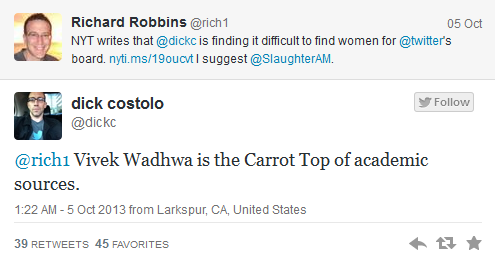There have been many stories circulating about the lack of women at tech companies and especially in the leadership ranks. Recently Twitter CEO Dick Costolo was beat up severely by academic Vivek Wadhwa for not having enough women, blacks or Hispanics on the board of the company as it prepares to go public. He further says that Silicon Valley is a boy’s club.
Let’s explore this idea for a moment. I’ll throw in my personal experiences to start things off. When I attended Engineering school at the University of Connecticut (UCONN) my physics for engineering class had over 100 people in it and less than five were women. This was par for the course for most of the engineering courses – there were more women in the programming classes but only enough to move the percentage to between 5-10%.
More personal experience – a fellow engineer friend is pleading with his daughters to go to engineering school but they say it is too nerdy. In other words, they have the brains and aptitude but social issues keep them from pursuing a life of math, physics and science.
The implication some are making against Costolo is he is anti-woman but if the choice of applicants is a small subset of all women, is it possible there simply enough females in the profession? Ditto for blacks and Hispanics – aside from women, I recall seeing perhaps one or two minorities among the hundreds of engineers who graduated with me. Of course the classes had plenty of foreign students – from Russia, the Ukraine and Asia.
Thankfully a voice of reason in the media is Melissa Barnes, Associate Editor for Product & Design news who says:
So why do women seem to find engineering so unappealing? Perhaps it can be simply explained by of a lack of awareness to the many opportunities in the industry. Or perhaps women hesitate to enter into a male-dominated field out of fear and intimidation, shying away from the highly competitive environment. Unfortunately, the root of the problem may be a much more complicated, societal issue that begins early on in the development of a child’s mind through the interest and skill-building fostered by parents and teachers. Since women are not commonly introduced to engineering at a young age, there is little chance for inspiring future engineers. Without the necessary seeds of curiosity, a young woman may never even consider the possibility of entering into the exciting world that engineering can be.
She goes on to say we need to get more women involved in engineering as their perspective is greatly needed. I would add to that we should be entirely inclusive and add every minority group.
The challenge is not only the nerdiness stigma but the fact that engineering is hard and moreover requires tremendous math expertise – and it has become quite fashionable in the US to say “I don’t do math.” Finally we have the cultural challenge associated with beauty and physical attributes such as body-building over brain-building. Millions of young viewers don’t watch the Jersey Shore or 16 and Pregnant to marvel at the IQ of the cast. Ditto for most television programming. Some decades back, the nation was 100% focused on science and engineering as the US raced to put a man on the moon. Since then we have regressed as a nation in my opinion – pop culture is a major influence in the choice of career and is likely the biggest reason the challenge exists.
But getting back to Twitter and minorities, if the implication is Twitter is intentionally passing over super-qualified women and minorities, I would like them to send me their resumes so I can hire them. I am sure there are thousands of companies who would feel the same way.
There isn’t a lack of women and minorities in tech companies by design and there is no club – there is simply a lack of interest from these groups in becoming engineers, scientists and researchers. After all, if a slew of foreign students can come to the US – some who barely can be understood by others because of their poor grammar and thick accents and they can rise to the top in Silicon Valley, anyone who chooses to – especially if they can be easily understood, will have little challenge rising to the top of the Valley if they so desire.





